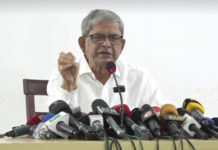Voters are undecided about going to the polling centres fearing violence

- Rickshaw-pullers look on at a burning bus after pro-blockade activists torch the vehicle in the city’s Gulistan yesterday
The country is heading into the 10th Parliamentary Polls tomorrow amid opposition’s boycott and threat to resist the polls, with tension, disappointment and fear of violence marring any chance of a festive mood.
Prime Minister Sheikh Hasina-led polls-time government is all set to hold the voting after the two major political parties – Awami League and BNP – have failed to reach a consensus over the mode of the administration that would oversee the polls.
The BNP-Jamaat-led 18-party opposition alliance have already announced resisting the polls and are in the middle of enforcing a non-stop blockade. Yesterday, the opposition combine also announced a 48-hour hartal for today and tomorrow protesting the polls.
“We have already instructed our leaders and activists to discourage the voters to not go to the polling centres [tomorrow],” said Osman Farruk, adviser to BNP chairperson Khaleda Zia, while making the hartal announcement yesterday.
Meanwhile, opposition leader and BNP Chairperson Khaleda Zia issued a statement yesterday terming the polls “farcical” and urging people to boycott the polls.
Khaleda said in the statement: “None from inside and outside the country will endorse this farce.”
When the Hasina-led interim government is all set to hold the polls, Khaleda Zia and HM Ershad, the leaders of the two other major political parties of the country, are living in virtual confinements.
Khaleda Zia has not been allowed to come out of her Gulshan residence while Ershad has been spending days in a hospital in the capital.
Voting will be held in 147 constituencies out of a total of 300, as candidates in 153 seats have already been elected unopposed.
A total of five districts – Chandpur, Shariatpur, Rajbari, Madaripur and Joypurhat – will not be seeing any voting because the candidates in their seats have been elected uncontested.
Except for these five districts, the government has announced public holidays in the remaining 59.
A total of 389 candidates are contesting in the 147 constituencies where 43,93,8931 voters will get the chance to exercise their voting rights. The number of polling centres in these constituencies are 18,209 and polling booths 91,213.
Only more than half of a total of 9.2 million voters in the country will not be able to exercise their voting rights in tomorrow’s elections because of the unopposed elections.
Twelve out of the 40 parties registered with the Election Commission are contesting in tomorrow’s polls.
Even many voters in those constituencies, where voting will take place from 8am to 5pm tomorrow, are wondering whether or not to go to the polling centres sensing violence.
Yesterday, opposition activists have set fire to more than a dozen poll centres in a number of constituencies in various districts including Feni, the home district of opposition leader Khaleda Zia.
The arson attacks were part of the nationwide violence that has been going on for the last few months centring the mode of the polls-time government and the trial of war criminals.
More than a hundred people have been killed since the opposition stated enforcing the countrywide blockade protesting tomorrow’s polls more than a month ago. Some of those have been killed in violence centring the execution of war criminal Jamaat-e-Islami leader Abdul Quader Molla.
To ensure peaceful voting, apart from a huge number of police, Rab and BGB personnel, the Election Commission has also deployed the army for 15 days.
The government’s health department has asked all public medical colleges, specialised, district and Upazila hospitals around the country to remain alert and take all-out preparations to ensure emergency healthcare services in case there are casualties and injuries resulting from violence. All these establishment are also advised to keep their emergency departments ready with special reinforcements.
However, while talking to the Dhaka Tribune, voters from a number of constituencies in and outside the capital, have expressed concerns about the situation on the Election Day.
Many female voters in particular, from a sense of insecurity, have expressed their unwillingness to go to the polling centres tomorrow.
In addition to the fear factor, many voters are in a big dilemma in their localities as the ruling Awami League is urging them to go to the polls without fear and the main opposition BNP is telling them to do the opposite.
Many have said they are scared that they may be labelled Awami League supporters if they go to cast their votes; while others said they would not want to be labelled as supporters of BNP by not going to the polling centres.
Despite the opposition boycott, in many constituencies, local BNP leaders are reportedly working for the candidates, who are contesting against Awami League runners.
There has been one instance of a similar kind of a polls on February 15, 1996, where the then ruling BNP held “one-sided” polls amid boycotts from the then main opposition Awami League and the other opposition parties including HM Ershad’s Jatiya Party and Jamaat. In that election, 49 candidates were elected uncontested.
Source: Dhaka Tribune









